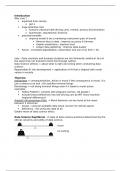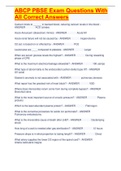Resume
Data Science and Ethics summary (Business Economics)
- Cours
- 2104TEWDAS (2104TEWDAS)
- Établissement
- Universiteit Antwerpen (UA)
Full summary of the course Data Science and Ethics given by prof David Martens within the major Data Science and AI in Business Economics. The summary includes notes from class, summary of the powerpoint slides and examples.
[Montrer plus]




